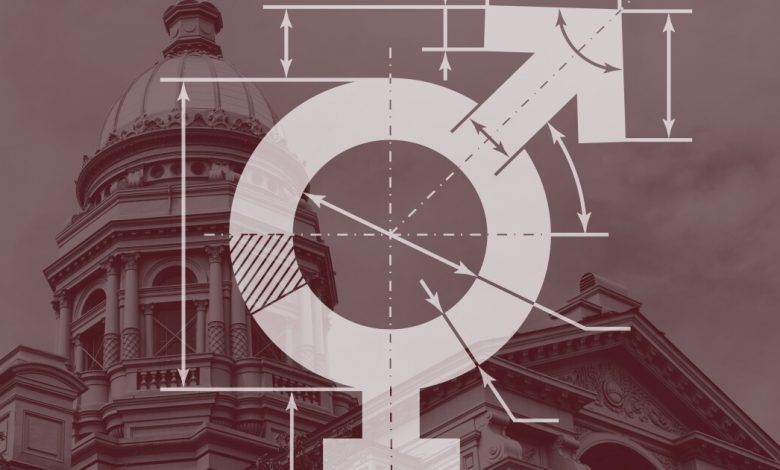Republican Lawmakers Target Gender Studies at U. of Wyoming

[ad_1]
Legislation to defund gender and women’s studies at the University of Wyoming has stoked faculty fears about how far lawmakers will go to stop public colleges from teaching courses they don’t like.
The Wyoming Senate voted on Friday to pass a budget amendment that would prevent the university from using state money for its gender and women’s studies program and courses, a move that would effectively eliminate them. While a version of the amendment died in the state’s House and its future is unclear, the mere possibility of its passage has left some Wyoming professors shaken by what they see as an infringement on their academic freedom.
“This amendment is incredibly ideological,” said Michelle Jarman, an associate professor of disability studies who serves as associate director of the gender and women’s studies program. “It’s basically saying that one person’s belief system should dictate an entire university curriculum, and that is dangerous ground.”
Jarman and other faculty members have begun a letter-writing campaign to pressure legislators not to pass the amendment. They also hope to start planning a march to Cheyenne, the state’s capital.
Edward Seidel, the university’s president, and Kevin Carman, the provost, said in a statement that they disagreed with the Senate’s vote and would continue monitoring the issue as the state-budget process moves forward.
The amendment’s Republican sponsor, Sen. Cheri Steinmetz, and other proponents believe the program perpetuates a progressive agenda and is “training activists,” as Steinmetz said in Friday’s session. Another supporter said gender and women’s studies is “an extremely biased, ideologically driven program” with no “academic legitimacy.”
As a field, women’s and gender studies has activist roots. The discipline, born out of the civil-rights movement, centers critical thought and discussion about gender disparities and discrimination. Gender studies has long been a political football for critics who claim that colleges are teaching subjects without academic merit.
But faculty members in the program argue that women’s and gender studies is an essential discipline — not only in and of itself, but because it informs so many others.
Gender and women’s studies at Wyoming is housed in the School of Culture, Gender, and Social Justice, which is part of the College of Arts and Sciences. Its affiliated scholars teach across multiple disciplines, including Native American and Indigenous studies, African American diaspora studies, Latinx studies, and American studies.
So a threat to the program could have wider implications. If the amendment went through, Jarman wondered, could those faculty members lose their positions, too?
“We have a long theoretical tradition that many other disciplines draw from — voices that have provided lenses that have allowed other fields to question their own biases,” Jarman said. “This is an attempt to erase very important work.”
Vague Wording
The Senate’s amendment would block any “general funds, federal funds, or other funds” within the university for “gender-studies courses, academic 8 programs, co-curricular programs, or extracurricular programs.”
Jacquelyn L. Bridgeman, a professor in Wyoming’s College of Law and director of the School of Culture, Gender, and Social Justice, said she was troubled by how vaguely the amendment was written. In fact, she said, its language could apply to all academic and extracurricular programs.
“Gender studies touches almost every single class taught at the university,” she said. “I teach employment law. Can I no longer teach sexual harassment or gender discrimination in class? I teach family law. Can I no longer teach same-sex marriage? Anything having to do with the study or discussion of gender — does that fall under that law?”
That apparent breadth could raise a constitutional issue, Bridgeman said, even though the Legislature has the authority to appropriate higher-education funding. She believes the legislation violates both the First and 14th Amendments.
If a law could defund gender studies, what would stop legislators from banning any subject they dislike?
Even if the amendment isn’t enacted into law, Sen. Chris Rothfuss, a Democrat, said on Friday that he was concerned about the precedent set by legislators seeking to block what the university can teach. If a law could defund gender studies, Rothfuss asked, what would stop legislators, in Wyoming or elsewhere, from banning any subject they dislike?
Something like that has happened in several states, where Republican legislators have sought to bar schools and colleges from teaching critical race theory. In Iowa, for instance, a law passed last year prohibits colleges from teaching, among other things, about “discomfort, guilt, anguish, or any other form of psychological distress” in relation to someone’s race or sex. Last month the lieutenant governor of Texas said he wanted to revoke the tenure of any professor teaching critical race theory.
Rothfuss’s question is what worries Kristen M. Barber, an associate professor of sociology and former director of women’s and gender studies at Southern Illinois University at Carbondale.
“I’m scared that as history departments get cut, as gender studies and race studies and ethnic studies become underfunded or under attack, we lose historical and current conversations about marginalized people and their experiences of the world,” Barber said.
Students often see themselves and their lived experiences in the classes, Barber said, giving the courses a natural appeal.
“The students who come through these classes, they’re not scared of what they’re going to be taught in gender-studies classes,” Barber said. “They’re not the ones making these decisions.”
[ad_2]
Source link






